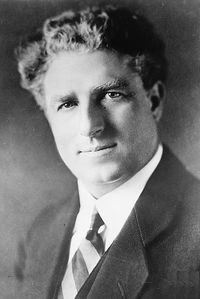Giovanni Martinelli, a renowned and legendary tenor, embarked upon a storied and illustrious career that would span an impressive three decades, from 1913 to 1945. Throughout his remarkable tenure, he consistently showcased an unwavering ability to captivate and enthrall audiences, thereby earning him unparalleled popularity and a reputation that rivaled that of the iconic Enrico Caruso at one point. As a specialist in the French and Italian repertoires, Martinelli's impressive vocal range and mastery of his craft enabled him to create the tenor leads in numerous premieres at the Metropolitan Opera, including the critically acclaimed productions of Granados' "Goyescas", Tchaikovsky's "Eugene Onegin", and Verdi's "Don Carlo".
Noted for his most remarkable achievement, a milestone moment in his illustrious career unfolded in the year 1937, when he took on the prestigious role of portraying the iconic title character in Verdi's magnificent opera, "Otello". This esteemed endeavor saw him share the stage with the renowned Lawrence Tibbett and the accomplished Helen Jepson, a trio of talented performers who came together to bring this iconic masterpiece to life.
Notably, this performance marked a significant highlight in his already impressive career, showcasing his remarkable vocal range and dramatic flair as he breathed life into the complex and troubled character of Otello.
Martinelli, despite having officially retired from the esteemed Metropolitan Opera in the year 1945, continued to embody the essence of a dynamic and spirited individual, frequently attending performances and receiving thunderous applause upon his entrances, often garnering more accolades than the evening's featured artists.
Martinelli's post-retirement life was marked by an unwavering passion for the world of opera, as he continued to attend performances with unwavering enthusiasm. His presence at these events was met with resounding applause, a testament to his enduring legacy and the deep respect he had earned from the opera community.
As he entered the opera house, Martinelli's entrances were often met with a standing ovation, his presence eclipsing the accolades bestowed upon the evening's featured artists. This phenomenon was a testament to his enduring charisma and the profound impact he had made on the world of opera.
Throughout his post-retirement life, Martinelli remained a beloved figure in the opera world, his continued involvement in the community a source of inspiration and joy to all who knew him. His legacy continued to inspire new generations of opera enthusiasts, and his memory remained an integral part of the Metropolitan Opera's rich history.
Martinelli's remarkable story serves as a testament to the enduring power of passion and dedication, as he continued to thrive in the world of opera long after his official retirement. His legacy continues to inspire and delight audiences to this day, a lasting tribute to his remarkable life and career.
Martinelli's ubiquitous presence was a hallmark of Metropolitan Opera events, with his notable appearances being a staple at the grand finale of the Old Metropolitan Opera House and the inaugural night of the new, state-of-the-art Metropolitan Opera House, both of which took place in the same momentous year of 1966.
Martinelli, now at the ripe age of eighty-one, took to the stage for the very last time to portray the majestic Emperor in a spectacular production of Puccini's iconic opera, "Turandot", which was meticulously crafted and presented by the renowned Seattle Opera, a prestigious institution that has been a cornerstone of the city's cultural scene, in the year 1967.
Martinelli's remarkable performance on stage was a resounding testament to his extraordinary vocal prowess, as he astonishingly showcased the astonishing fact that his voice had managed to retain its characteristic luster and vibrancy, despite the passage of time and the natural aging process, which would have normally led to a diminution of his vocal abilities, but not in this case, where his remarkable voice continued to shine brightly, a true marvel of the human instrument.
Martinelli's life was a testament to the profound and lasting influence one person can have on the world, as he traversed the intricate and often treacherous landscape of existence with an unwavering resilience, his unrelenting passion for music serving as a beacon of inspiration and comfort that sustained him through life's trials and tribulations.











